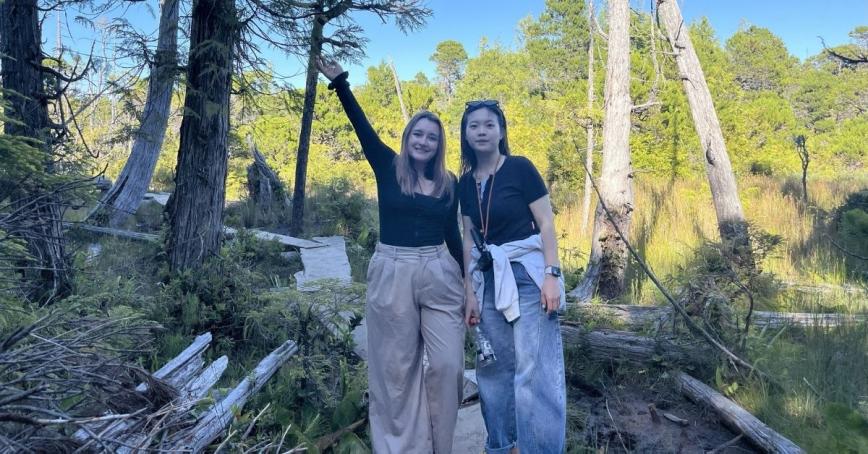AI-influenced travel: How tourism is evolving

Learn more about Royal Roads University’s School of Tourism and Hospitality Management and Mitacs Globalink Research Internships.
Standing in downtown Victoria, it’s easy to see how travellers navigate the city, from paper maps to apps on their devices. Just how many smart apps there are, and how they influence travellers’ behaviours, is not as visible.
That’s the focus of research led by Dr. Moira McDonald, director of Royal Roads University’s School of Tourism and Hospitality Management, with Barbara Fredericksen Munoz and April Chen, two Mitacs Globalink Research Internship students, and in collaboration with Dr. Michael Lever from Fairleigh Dickinson University, BC.
The project, called “What Makes a Destination Smart: How do tourists interact with smart destinations?”, looks at how people use smart travel apps during their trips and how understanding those behaviours can help tourism operators.
It’s encouraging to see how many people are using preplanning apps to find their way in the best possible way, so how do we help our travelling community feel good about coming to BC and enjoying it in a good way?
“(We are looking at) the ways people are using technology as a tourist or as an organization welcoming tourists,” McDonald says. “It’s encouraging to see how many people are using smart travel apps in the best possible way to enhance their experience. So how do we help our tourists and local communities enjoy BC in a good way?”
There is research on how travellers feel about their experiences after the fact, but less so on what influenced or improved their experience while actively visiting the destination. That’s where this project comes in.
The team is looking through the lens of what makes a destination a “smart city,” meaning it embraces smartphone-enabled technologies and data collection to enhance the experience of people visiting and living there. With technology changing and evolving so quickly, there’s no established road map for research on this topic, says Chen, who joined the team in July to start her internship.
That’s why the team turned to an unlikely source for data — Reddit. They combed through conversations from around the world where people were talking about the must-have apps for keeping their trips well-organized and personalized to their interests.
What they found were countless posts from people talking about the apps they use — from language translation to managing jet lag and staying calm while on the move. Expense tracking, social networking, reviews, maps and even dating apps were often cited.
The research team will review that data, as well as information gathered from a survey, before making suggestions on what tourism operators and destinations could do to enhance information sharing via smart travel apps to support sustainable tourism and local economies.
“If we can learn more about the goals, motivations and behaviours of travellers, we will be able to figure out some useful suggestions for the people who are working in the tourism industry,” Chen says.
Mitacs research interns bring valuable insights
Having international researchers on the project is a great way to bring different perspectives and create an opportunity for two undergraduate students to expand their studies beyond the classroom and into a new culture, McDonald says.
Interest in the project was high, and ultimately, Fredericksen Munoz from Chile, who focused on the qualitative data, and Chen from China, who is focused on the quantitative data, were offered individual three-month internships.
“These students were my top picks, and lucky for me, they picked RRU as well. It’s a wonderful match-up process and well managed by Mitacs Canada,” McDonald says. “I have research partners for life now across continents who will take this experience forward in their own lives. We might not have any idea today how powerful this kind of engagement is and what positive results globally are possible.”
Chen echoes the value of the experience.
“It is very useful for my studies,” she says. “It helps expand the way I think, and I get to know more about the world.”
How she and others will plan for and navigate that world in future travels – well, that’s an evolving question.